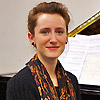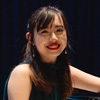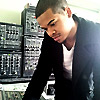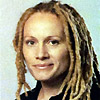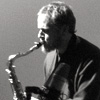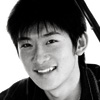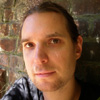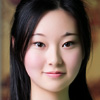Chris Bourke interview - Page 7
Chris: Apart from Vaughan Williams, Sibelius is the other composer often mentioned with your music.
Douglas: Well he made a profound impression on me when I was first a student at Christchurch. You could in fact hear there was a language of a different kind, and something that I'd been waiting to hear. Although I like my Beethoven, my Brahms, my Chopin of course, but when I first heard Sibelius' Number Two, the slow movement, I felt I'd come home to something.
Chris: The different flavour.
Douglas: Yes and his rhythms of course derive much more from nature whereas traditional European rhythms derive from traditional dance or from those wretched military bands "pom pompa dom pom pah"
Chris: What did you hear of the Viennese School after the war.
Douglas: Very little until quite late. I must say I heard Schoenberg Gurrelieder before I went off to England, played on the radio, and I wrote a longer letter to Professor Shelly about it and got a longer letter back [laughs]. I was bowled over by this piece and he was probably bowled over to get a letter about it. But it took me a long time to come to terms with the later Schoenberg; in fact I've never really come to terms with it. I've not been able to hear works like Wozzeck in the theatre and feel it would be important to do this, and Webern has always seemed to me like a slightly foreign language.
Douglas: I remember Stockhausen, when I went to Darmstadt, talking about one or two works in class and he had all these students counting rows - serial rows; he kept on saying "schnell schnell - you must do it fast" - and somebody pulled up in the middle of a row and said "Was ist Das?" - he couldn't get this number right. "Das geht nicht" he said "Ach ja ja" and off he went again. I thought it was the silliest nonsense I'd ever heard. I supposed it is one way of playing a game but it never seemed very relevant really to music.
Chris: That school did have its influence though when you started to experiment yourself.
Douglas: Yes, but not just because of that school - I think it came rather more from studying some of the later Stravinsky works. When he was using modified serial technique - throughout the 50s. It was later I went to Darmstadt, I went overseas in 55 and 56 but it wasn't then I went to Darmstadt, I was exploring twelve tone music at that time, though I hadn't come to terms with it. I think this influence begins to show in some works of the 50s like Quartet for Brass Instruments and the Wind Quintet, Three Songs for Viola and Piano, and an orchestral work A Birthday Offering. In that case I was using just four notes and playing with them in serial manner - its hard enough to put four or five notes up in the air and keep them up, rather than twelve.
Chris: What did you do during that 1955 trip.
Douglas: I went straight over to Tanglewood Summer School where the Boston Symphony Orchestra spent its summer holidays, hoping to work with Copland, but he wasn't there I'm afraid, and worked with Roger Sessions who I didn't get on with very well, and I couldn't bear the heat and humidity day and night 100 degrees. And I was utterly disappointed that we were not allowed as students to go into rehearsals and we couldn't properly hear concerts because all the seats were sold to patrons of the Boston Symphony Orchestra so it was like being in the centre of Athletic Park while they are playing up the back of the grandstand - literally - so I headed over to London and later in the year worked with Ben Frankel which was good for technique again.
Douglas: I think I made a first acquaintance of serialism in that trip overseas but when I came back I had to work very much on my own but I kept studying it to see what it could do for me and finally this bore fruit, if at all, in the "Third Symphony". But even that is only modified serial technique and I think that is as far as I would want to take it.
Chris: I'm reflecting the emphasis that the Victoria Music Department put on Serialism.
Douglas: Well it's much easier to talk in class about serial works… new maths.
Chris: Third Symphony beginning with serialism in "Sings Harry".
Douglas: I was horrified when Ross came out with that article in Canzona. It bloody well didn't. The symphony began with a twelve-note row on the trumpet, which appears at figure twelve in the score, that was what the French called Le Donner - the given thing.


